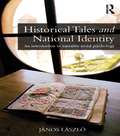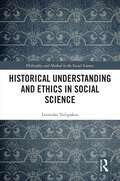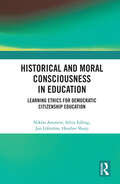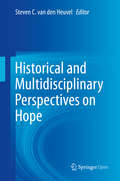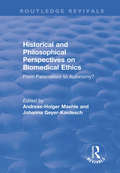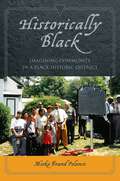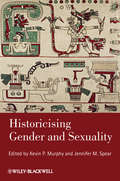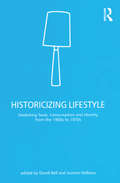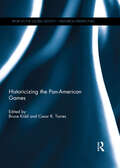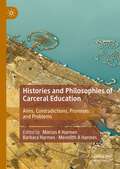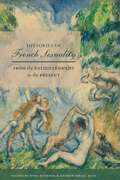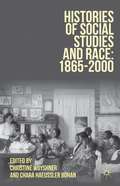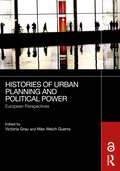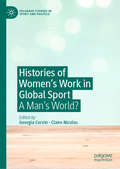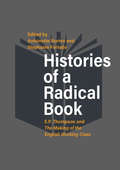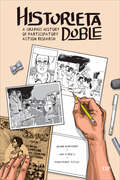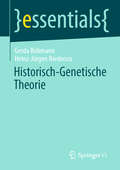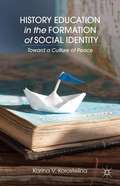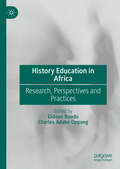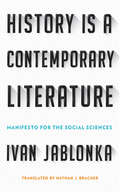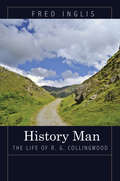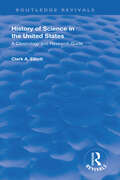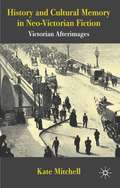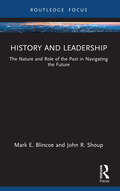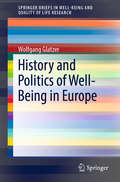- Table View
- List View
Historical Tales and National Identity: An introduction to narrative social psychology
by János LászlóSocial psychologists argue that people’s past weighs on their present. Consistent with this view, Historical Tales and National Identity outlines a theory and a methodology which provide tools for better understanding the relation between the present psychological condition of a society and representations of its past. Author Janos Laszlo argues that various kinds of historical texts including historical textbooks, texts derived from public memory (e.g. media or oral history), novels, and folk narratives play a central part in constructing national identity. Consequently, with a proper methodology, it is possible to expose the characteristic features and contours of national identities. <P><P>In this book Laszlo enhances our understanding of narrative psychology and further elaborates his narrative theory of history and identity. He offers a conceptual model that draws on diverse areas of psychology - social, political, cognitive and psychodynamics - and integrates them into a coherent whole. In addition to this conceptual contribution, he also provides a major methodological innovation: a content analytic framework and software package that can be used to analyse various kinds of historical texts and shed new light on national identity. In the second part of the book, the potential of this approach is empirically illustrated, using Hungarian national identity as the focus. The author also extends his scope to consider the potential generalizations of the approach employed. <P><P>Historical Tales and National Identity will be of great interest to a broad range of student and academic readers across the social sciences and humanities: in psychology, history, cultural studies, literature, anthropology, political science, media studies, sociology and memory studies.
Historical Understanding and Ethics in Social Science (Philosophy and Method in the Social Sciences)
by Leonidas TsilipakosCan social scientific description capture the historically individual? Is the idea of an ethically committed social science morally defensible? This book offers a critical, historically-grounded perspective on these perennial methodological and ethical problems, in their current forms. It provides a series of in-depth examinations of recent work by prominent authors in sociology and philosophy. The book draws on the thought of Peter Winch to provide a coherent response to the core issues that underlie past and present debate in social science and to provide a solid basis for future inquiry. It will be of particular interest to social scientists, philosophers, and historians, and to anyone seeking a clear grasp of the demands made by historical understanding and ethics on the study of society.
Historical and Moral Consciousness in Education: Learning Ethics for Democratic Citizenship Education
by Silvia Edling Heather Sharp Niklas Ammert Jan LöfströmHistorical and Moral Consciousness highlights how ethics can be understood in the context of History education. It analyses the qualitative differences in how young people respond to historical and moral dilemmas of relevance to democratic values and human rights education. Drawing on a four-year international project, the book offers nuanced discussion and new scholarly understanding of the intersections between historical consciousness and moral consciousness within research. It develops new theoretical tools for history teaching and learning that can support teachers as they endeavor to educate for democratic citizenship. The book includes a meta-analysis of research within history Didaktik and around historical events with a moral bearing, and presents a comparative study of Australian, Finnish, and Swedish high school students’ moral understandings of historical dilemmas. Raising important questions about how our learning from the past is intertwined with our present and future interpretations and judgements, this book will be of great interest to academics, scholars, teachers, and post graduate students in the fields of history education, democratic education, human rights education, and citizenship education.
Historical and Multidisciplinary Perspectives on Hope
by Steven C. van den HeuvelThis open access volume makes an important contribution to the ongoing research on hope theory by combining insights from both its long history and its increasing multi-disciplinarity. In the first part, it recognizes the importance of the centuries-old reflection on hope by offering historical perspectives and tracing it back to ancient Greek philosophy. At the same time, it provides novel perspectives on often-overlooked historical theories and developments and challenges established views. The second part of the volume documents the state of the art of current research in hope across eight disciplines, which are philosophy, theology, psychology, economy, sociology, health studies, ecology, and development studies. Taken together, this volume provides an integrated view on hope as a multi-faced phenomenon. It contributes to the further understanding of hope as an essential human capacity, with the possibility of transforming our human societies.
Historical and Philosophical Perspectives on Biomedical Ethics: From Paternalism to Autonomy? (Routledge Revivals)
by Andreas-Holger Maehle Johanna Geyer-KordeschThis title was first published in 2002: This volume discusses the subject of biomedical ethics. Various views, historical and contemporary, are discussed, with the editors using the contrasting concepts in the shift from paternalism to autonomy in 20th-century medicine as a heuristic tool for the critical study of ethics in medicine.As far as the evidence in this volume goes, paternalistic medical practices and patient autonomy had an uneasy relationship by the beginning of the 20th century. A hundred years later, full autonomy in decisions on medical treatment is still subject to numerous caveats. The text pays close attention to the interplay between various players, noting how factors such as social contexts, governmental organizations and the biotechnological industry influence and shape responses to the principle of bioethics.
Historically Black: Imagining Community in a Black Historic District
by Mieka Brand PolancoQuestions the way we understand the idea of community through an investigation of the term "historically black"In Historically Black, Mieka Brand Polanco examines the concept of community in the United States: how communities are experienced and understood, the complex relationship between human beings and their social and physical landscapes—and how the term “community” is sometimes conjured to feign a cohesiveness that may not actually exist. Drawing on ethnographic and historical materials from Union, Virginia, Historically Black offers a nuanced and sensitive portrait of a federally recognized Historic District under the category “Ethnic Heritage—Black.”Since Union has been home to a racially mixed population since at least the late 19th century, calling it “historically black” poses some curious existential questions to the black residents who currently live there. Union’s identity as a “historically black community” encourages a perception of the town as a monochromatic and monohistoric landscape, effectively erasing both old-timer white residents and newcomer black residents while allowing newer white residents to take on a proud role as preservers of history.Gestures to “community” gloss an oversimplified perspective of race, history and space that conceals much of the richness (and contention) of lived reality in Union, as well as in the larger United States. They allow Americans to avoid important conversations about the complex and unfolding nature by which groups of people and social/physical landscapes are conceptualized as a single unified whole. This multi-layered, multi-textured ethnography explores a key concept, inviting public conversation about the dynamic ways in which race, space, and history inform our experiences and understanding of community.
Historicising Gender and Sexuality (Gender and History Special Issues #9)
by Kevin P. Murphy Jennifer M. SpearHistoricising Gender and Sexuality features a diverse collection of essays that shed new light on the historical intersections between gender and sexuality across time and space. Demonstrates both the particularities of specific formulations of gender and sexuality and the nature of the relationship between the categories themselves Presents evidence that careful and contextualised analysis of the shifting relationship of gender and sexuality illuminates broader historical processes
Historicizing Lifestyle: Mediating Taste, Consumption and Identity from the 1900s to 1970s
by David BellLifestyles have a history, and lifestyle media is fundamentally implicated in this history. This original volume examines issues of taste, media and lifestyle from the 1900s to 1970s, providing a wealth of empirical evidence and debate from varied international perspectives. Including examples as diverse as 'Good Housekeeping' and 'Playboy', it explores the continuities and discontinuities between the past and present to provide a better understanding of the representation of lifestyle and its relationship to the self. The volume demonstrates how ideas about gender, nation and 'race' problematize taken-for-granted assumptions about lifestyle, with particular emphasis on the new middle classes in the US. The book also examines the role of advertising and marketing in mediating ideas about lifestyle, the role of material culture in the construction of cultural hierarchies and the positioning of social groups within wider cartographies of taste. The volume makes a significant contribution to this growing field and will interest academics and students in media and cultural studies, communication studies, cultural history and sociology.
Historicizing the Pan-American Games (Sport in the Global Society - Historical Perspectives)
by Bruce Kidd and Cesar R. TorresThe Pan-American Games, begun officially in 1951 in Buenos Aires and held in every region of the western hemisphere, have become one of the largest multi-sport games in the world. 6,132 athletes from 41 countries competed in 48 sports in the 2015 Games in Toronto, Canada. The Games are simultaneously an avenue for the spread of the Olympic Movement across the Americas, a stage for competing ideologies of Pan-American unity, and an occasion for host city infrastructural stimulus and economic development. And yet until this volume, the Games have never been studied as a single entity from a scholarly viewpoint. Historicizing the Pan-American Games presents 12 original articles on the Games. Topics range from the origins of the Games in the period between the world wars, to their urban, hemispheric and cultural legacies, to the policy implications of specific Games for international sport. The entire collection is set against the shifting economic, social, political, cultural, sporting and artistic contexts of the turbulent western hemisphere. Historicizing the Pan-American Games makes a significant contribution to the literature on major games, Olympic sport and sport in the western hemisphere. This book was previously published as a special issue of The International Journal of the History of Sport.
Histories and Philosophies of Carceral Education: Aims, Contradictions, Promises and Problems
by Barbara Harmes Marcus K Harmes Meredith A HarmesThis edited collection encourages philosophical exploration of the nature, aims, contradictions, promises and problems of the practice of education within prisons around the world. Such exploration is particularly necessary given the complex operational barriers to education, and higher education in particular, within prison-based teaching and learning. These operational barriers are matched by cultural and polemical barriers, such as the criticism of diverting resources to and spending money on prisoner education when the cost of some education seems prohibitive for people outside prison. More so than in other education contexts, prison education may fall short of higher ideals because it is shot through with both practical and moral-political problems and challenges, especially in the age of global late capitalism, high technology and mass incarceration or securitization. This book includes insights and issues around a wide range of areas including: ethics, religion, sociology, justice, identity and political and moral philosophy.
Histories of French Sexuality: From the Enlightenment to the Present
by Nina Kushner Andrew Israel RossHistories of French Sexuality contends that the history of sexuality is at a crossroads. Decades of scholarship have shown that sexuality is implicated in a wide range of topics, such as studies of reproduction, the body, sexual knowledge, gender identity, marriage, and sexual citizenship. These studies have broadened historical narratives and interpretations of areas such as urbanization, the family, work, class, empire, the military and war, and the nation. Yet while the field has evolved, not everyone has caught on, especially scholars of French history. Covering the early eighteenth century through the present, the essays in Histories of French Sexuality show how attention to the history of sexuality deepens, changes, challenges, supports, or otherwise complicates the major narratives of French history. This volume makes a set of historical arguments about the nature of the past and a larger historiographical claim about the value and place of the field of the history of sexuality within the broader discipline of history. The topics include early empire-building, religion, the Enlightenment, feminism, socialism, formation of the modern self, medicine, urbanization, decolonization, the social world of postwar France, and the rise of modern and social media.
Histories of Social Studies and Race: 1865–2000
by Christine Woyshner Chara Haeussler BohanIn Histories of Social Studies and Race: 1865-2000, researchers investigate the interplay of race and the emerging social studies field from the time of the Emancipation of enslaved peoples in the second half of the nineteenth century to the multicultural and Afrocentric education initiatives of the late-twentieth century. The chapters incorporate viewpoints from various regions and local communities, as well as different ideas and ideals regarding teaching about race and Black history. This volume makes a case for considering the goals of such efforts - whether for individual development or social justice - and views the teaching of social studies education through the lens of race.
Histories of Urban Planning and Political Power: European Perspectives
by Victoria GrauUrban planning has always been a preeminent instrument of political power. In this volume, contributions from Europe and Latin America provide insight into the functions of planning under very different political and societal constellations over the last hundred years: dictatorships, parliamentary democracies, and illiberalism; capitalism and state socialism; state interventionism and neoliberalism; societies in times of peace and societies marked by colonial, civil, world, or cold wars.The dictatorships of the 1920s and 1930s made extensive use of the potential of planning for economic growth, for brutal repression, but also for the integration of certain population groups and as an effective means of propaganda. The legacy of these dictatorships still characterizes many European cities today and confronts planning with complex tasks. Dictatorial state socialism planned to establish a new social order with a particular technocratic rationality, which did not, however, cancel completely the tendential autonomy of the professional planning sphere. Parliamentary democracies and illiberal regimes have developed specific new practices of using planning to rebuild cities in the interests of neoliberal economic growth and populistic legitimization of power.Histories of Urban Planning and Political Power takes the next steps in significantly expanding our understanding of planning and politics. The book will be of interest to students and scholars of urbanism, urban/town planning, spatial planning, spatial politics, urban development, urban policies, and planning history and European history of the 20th century.The Open Access version of this book, available at http://www.taylorfrancis.com, has been made available under a Creative Commons Attribution-Non Commercial-No Derivatives (CC-BY-NC-ND) 4.0 license.
Histories of Women's Work in Global Sport: A Man’s World? (Palgrave Studies in Sport and Politics)
by Georgia Cervin Claire NicolasSport has never been a man’s world. As this volume shows, women have served key roles not only as athletes and spectators, but as administrators, workers, decision-makers, and leaders in sporting organizations around the world. Contributors excavate scarce archival material to uncover histories of women’s work in sport, from swimming teachers in nineteenth-century England to national sports administrators in twentieth-century Côte d’Ivoire, and many places in between. Their work has been varied, holding roles as teachers, wives, and secretaries in sporting contexts around the world, often with diplomatic functions—including at the 1968 and 1992 Olympic Games. Finally, this collection shows how gender initiatives have developed in sporting institutions in Europe and international sport federations today. With a foreword by Grégory Quin and afterword by Anaïs Bohuon, this is a pioneering study into gender and women’s work in global sport.
Histories of a Radical Book: E. P. Thompson and <em>The Making of the English Working Class</em>
by Antoinette Burton and Stephanie FortadoFor better or worse, E.P. Thompson’s monumental book The Making of the English Working Class has played an essential role in shaping the intellectual lives of generations of readers since its original publication in 1963. This collected volume explores the complex impact of Thompson’s book, both as an intellectual project and material object, relating it to the social and cultural history of the book form itself—an enduring artifact of English history.
Historieta Doble: A Graphic History of Participatory Action Research (ethnoGRAPHIC)
by Joanne Rappaport Lina Flórez G. Pablo Pérez “Altais”In the 1970s, new methods of social science research began to flower in Latin America, connecting academic researchers to grassroots social movements. One of these was participatory action research, a method now used by community organizers, educational activists, and social scientists around the world. Historieta Doble traces the roots of participatory action research to the Caribbean coast of Colombia, and to the work of visionary sociologist Orlando Fals Borda with the Colombian Peasant Movement. Beautifully illustrated, this graphic novel shows how Fals Borda combined research and theory with political participation and activism, using comics to capture rural historical memory and allow peasants to see themselves as historical actors. This graphic history presents a fascinating journey through time, weaving Fals Borda’s original research with Joanne Rappaport’s contemporary reconstruction of his compelling story. The book features the artistic work of Ulianov Chalarka, whose comic panels brought Fals Borda’s research to life in the 1970s. Historieta Doble is a visual and narrative feast that transcends eras, connecting the past and present within the vibrant world of Latin American comics.
Historisch-Genetische Theorie (essentials)
by Gerda Bohmann Heinz-Jürgen NiedenzuDie historisch-genetische Theorie verfolgt den Anspruch, die Genese der menschlichen kulturellen Lebensweise aus den naturgeschichtlichen Ausgangsbedingungen und die historisch differenten gesellschaftlichen Organisationsformen in ihrer Strukturfolge erklären zu können. Für die Theorie zentral ist das methodologische Primat ontogenetischer Entwicklungsprozesse. Die gesellschaftlichen Organisationsformen sind diesen konstruktiv verbunden, folgen in ihrer Entwicklung aber anderen Mechanismen. Es werden die Grundlagen der Theorie herausgearbeitet und auf deren zentrale Fragen und Themenbereiche eingegangen.
History Education In The Formation Of Social Identity
by Karina V. KorostelinaIn order to determine how history education can be harnessed to reduce conflict attitudes and intentions and create a culture of peace, this book examines how history curricula and textbooks shape the identities of their students through their portrayals of ingroup and outgroup identity, intergroup boundaries, and value systems.
History Education in Africa: Research, Perspectives and Practices
by Gideon Boadu Charles Adabo OppongThis collection brings together African scholars in Africa and the diaspora to contribute to scholarly debates about critical issues in history teaching and learning in African schools. The book contributes to filling the gap in knowledge on African history, associated pedagogies and practices and its consequent effects on research and the declining popularity of history in African Schools. Specifically, the volume (a) examines current trends and practices in history education in African schools, (b) unveils the challenges and subtleties of teaching the next generation of teachers and students, and (c) examines classroom practices and opportunities for engagement with historical concepts in African schools. The book adds a much-needed African voice to the international history education literature and contribute to strengthening the place of history teaching and learning in Africa.
History Is a Contemporary Literature: Manifesto for the Social Sciences
by Ivan JablonkaIvan Jablonka’s History Is a Contemporary Literature offers highly innovative perspectives on the writing of history, the relationship between literature and the social sciences, and the way that both social-scientific inquiry and literary explorations contribute to our understanding of the world. Jablonka argues that the act and art of writing, far from being an afterthought in the social sciences, should play a vital role in the production of knowledge in all stages of the researcher’s work and embody or even constitute the understanding obtained. History (along with sociology and anthropology) can, he contends, achieve both greater rigor and wider audiences by creating a literary experience through a broad spectrum of narrative modes.Challenging scholars to adopt investigative, testimonial, and other experimental writing techniques as a way of creating and sharing knowledge, Jablonka envisions a social science literature that will inspire readers to become actively engaged in understanding their own pasts and to relate their histories to the present day. Lamenting the specialization that has isolated the academy from the rest of society, History Is a Contemporary Literature aims to bring imagination and audacity into the practice of scholarship, drawing on the techniques of literature to strengthen the methods of the social sciences.
History Man: The Life of R. G. Collingwood
by Fred InglisThis is the first biography of the last and greatest British idealist philosopher, R. G. Collingwood (1889-1943), a man who both thought and lived at full pitch. Best known today for his philosophies of history and art, Collingwood was also a historian, archaeologist, sailor, artist, and musician. A figure of enormous energy and ambition, he took as his subject nothing less than the whole of human endeavor, and he lived in the same way, seeking to experience the complete range of human passion. In this vivid and swiftly paced narrative, Fred Inglis tells the dramatic story of a remarkable life, from Collingwood's happy Lakeland childhood to his successes at Oxford, his archaeological digs as a renowned authority on Roman Britain, his solo sailing adventures in the English Channel, his long struggle with illness, and his sometimes turbulent romantic life. In a manner unheard of today, Collingwood attempted to gather all aspects of human thought into a single theory of practical experience, and he wrote sweeping accounts of history, art, science, politics, metaphysics, and archaeology, as well as a highly regarded autobiography. Above all, he dedicated his life to arguing that history--not science--is the only source of moral and political wisdom and self-knowledge. Linking the intellectual and personal sides of Collingwood's life, and providing a rich history of his milieu, History Man also assesses Collingwood's influence on generations of scholars after his death and the renewed recognition of his importance and interest today.
History Of Science In The U.S.
by Clark A. ElliottFirst published in 1996. The intention of this volume is two-fold: first, to give a chronologically arranged overview of selected data on the history of science in the United States, and second, to orient the reader to the substantial reference literature and research sources as guidance to further study of the topic. The subject areas that are covered include astronomy, biology, chemistry, geology, mathematics, physics, and their related disciplines; areas such as anthropology and psychology are covered to a lesser extent. Science is the central focus, but the content of the work recognizes that the boundaries between subjects or activities are not absolute and certainly not when coverage spans several centuries.
History and Cultural Memory in Neo-Victorian Fiction: Victorian Afterimages
by Kate MitchellArguing that neo-Victorian fiction enacts and celebrates cultural memory, this book uses memory discourse to position these novels as dynamic participants in the contemporary historical imaginary.
History and Leadership: The Nature and Role of the Past in Navigating the Future (Leadership Horizons)
by John R. Shoup Mark E. BlincoeLeaders and managers are rightly tasked to take their organizations and communities to a desired future. They are expected to be forward looking with compelling vision statements. As a result, they are often too busy in the present managing the future to be bothered with the past. Yet it is organizational histories that provide the contexts and clues for the future. History and Leadership: The Nature and Role of the Past in Navigating the Future demonstrates that intentional historical perspective-taking provides a sort-of wisdom for doing business in the present and future and equips leaders to leverage the past to help their organizations thrive. This book appeals to several audiences. It will serve as a supplementary text for undergraduate and graduate students in both the humanities and leadership studies. The book also appeals to practicing leaders and managers who wish to develop their emotional, cultural, and social intelligence by exploring perennial issues and lessons found in well-developed histories. This book also serves as a stand-alone read for a range of professionals who want a more recreational and non-traditional read on history and leadership. The book cultivates an appreciation for history and equips readers to be connoisseurs of history for the betterment of themselves and society.
History and Politics of Well-Being in Europe (SpringerBriefs in Well-Being and Quality of Life Research)
by Wolfgang GlatzerThis book presents a reconstruction of the history of well-being on the European continent with special attention to the European Union, as people from Europe have a history of a long-term march towards well-being. It discusses ancient civilizations on the European continent, which have contributed significantly to the features of well-being in contemporary Europe. Following Europe`s success over the past millennium, which brought the continent a unique rise to better well-being it also imposed new challenges for sustaining well-being and alleviating misery. It is shown that Europeans attained a high level of well-being in global comparison, yet their attitudes remained at the same time ambivalent and precarious. Significant parts of the population claim a low well-being and suffer from the difficulties of life. Even though a top ranked area of socio-economic development in the world, this book shows that poverty, inequality and hardship remain stable structural problems which have to be overcome in order to avoid significant restrictions for a broad quality of life. But despite all their burdens and hardships, Europeans are among the most prosperous and privileged people in the world.
